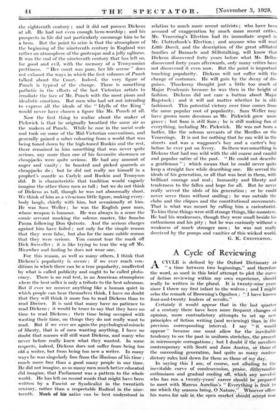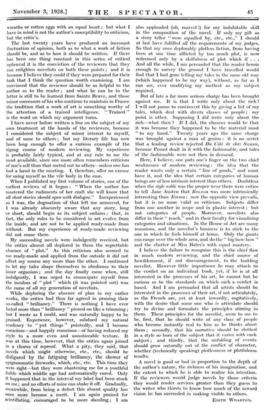A Cycle of Reviewing
•
ACYCLE is defined by the Oxford Dictionary as " a time between two beginnings," and therefore the word, as used in this brief attempt to plot the curve of fiction reviewing within. my own experience, Should really be written in the plural. It is twenty-nine years since I threw my first infant to the wolves ; and I might echo the remark of Browning's Ogniben : " I have known four-and-twenty leaders of revolts." Certainly it would appear that in the last quarter of a century there have been more frequent changes of opinion, more contradictory attempts to set up new principles of fiction writing (and reviewing) than in the previous corresponding interval. I .say " it would appear " because one must allow for the inevitable tendency to see the past in uniform stretches, ;the present in microscopic corrugations; but I doubt if the novelists contemporary with Scott and Jane Austen,, or those of many succeeding generation, had quite as ny contra- dictory rules_laid down for them as those:of my day. In saying this I am, of course, not alluding to the inevitable curve of condescension, praise, dithyrambic enthusiasm and gradual cooling off, which any novelist who has run a twenty-yearS' .career should be prepared to meet with Marcus _Aurelins's " Everything is fruit to me which thy seasons bring, 0 Nature." Whoever Offers his wares.for sale in the open markef shonid accept pt rose wreaths or rotten eggs with an equal heart ; but what I have in mind is not the author's susceptibility to criticism, but the critic's.
The last twenty years have produced an incessant fluctuation of opinion, both as to what a work of fiction should be, and as to how it should be written. If there has been one thing constant in this series of critical upheaval it is the conviction of the reviewers that they can enlighten novelists on both these points ; and it is because I believe they could if they were prepared for their task that I think the question worth examining. I am convinced that the reviewer should be as helpful to the author as to the reader ; and what he can be to the latter is still to be learned from Sainte Beuve, and those minor successors of his who continue to maintain in France the tradition that a work of art is something worthy of the attention of a trained intelligence. " Trained " is the word on which my argument turns.
I have never before written a line on the subject of my own treatment at the hands of the reviewers, because I considered' the subject of minor interest to myself, and of none to others ; but my literary life has now been long enough to offer a curious example of the zigzag course of modern reviewing. My experience is probably fairly typical, and at any rate to me the most available, since one more often remembers criticism of one's self than that meted out to others—unless one has had a hand in the meeting. I, therefore, offer no excuse for using myself as the vile body in the case.
When I published my first volume of stories, one of the earliest reviews of it began " When the author has mastered the rudiments of her craft she will know that all short stories should open with dialogue." Inexperienced as I was, the dogmatism of that left me unmoved, for I was already obscurely aware that any story, long or short, should begin as its subject ordains ; that, in fact, the only rules to be considered in art evolve from the inside, and are not to be applied ready-made from without. But my experience of ready-made reviewing did not cease there.
My succeeding novels were indulgently received, but the critics almost all deplored in them the regrettable absence of " plot." As this criticism also seemed to me ready-made and applied from the outside it did not affect my course any more than the other. I continued to let my tales shape themselves in obedience to their inner organism ; and the day finally came when, still indulgently; I was urged to emancipate myself from the incubus of " plot " which (it was pointed out) was the curse of all my generation of novelists.
While deploring the absence of plan in my earlier works, the critics had thus far 'agreed in praising their so-called " brilliancy." There is nothing I have ever hated more than " brilliancy " pinned on like a trimming ; but I wrote as I could, and was naturally happy to be praised. Experience, however, subdued my natural tendency to " put things " pointedly, and I became conscious-- and happily conscious—of having reduced my style to a more even and unnoticeable texture. It was at this time, however, that the critics again joined in a chorus of reproof. What a pity, they said, that novels which might otherwise, etc., etc., should be diAgured by the fatiguing brilliancy, the shower of epigrammatic fireworks, which, etc., etc. This time they were right—but they were chastening me for a youthful foible which middle age had automatically cured. Only it happened that in the interval my label had been stuck on me ; and no efforts of mine can shake it off. Gradually, meanwhile, from being . a defect, this absent quality has once more become a merit. I am again praised for scintillating, encouraged to be more dazzling; I am also applauded (oh, marvel I) for my indubitable skill in the composition of the novel. If only my gift as a story teller " were equalled by, etc., etc.," I should at last have fulfilled all the requirements of my judges. So that my once deplorably plotless fiction, from having been at one time afflicted by too much plot, is now redeemed only by a skilfulness of plot which if . . . And all the while, I am persuaded that the reader heroic enough to survey the ground I have travelled would find that I had gone telling my tales in the same old way (which happened to be my way), without, as far as I can see, ever modifying my method as my subject required.
But of late a far more serious charge has been brought against me. It is that I write only about the rich ! I will not pause to controvert this by giving a list of my tales, which deal with divers classes of people ; my point is other. Supposing I did write only about the rich—what then ? If I did, the chances would be that it was because they happened to be the material most " to my hand." Twenty years ago the same charge was brought against a man of genius : it is no secret that a leading review rejected Du Cote de chez Swann, because Proust dealt in it with the fashionable, and tales of the fashionable were not then in demand.
Here, I believe, one puts one's finger on the two chief weaknesses of modern reviewing : the idea that the reader wants only a certain " line of goods," , and must have it, and the idea that certain categories of human beings are of less intrinsic interest than others. Doubtless when the style noble was the proper wear there were critics to tell Jane Austen that Rowena was more intrinsically interesting than Emma ; now the opposite view prevails, but it is no more valid as criticism. Subjects differ from one another in scope and in plastic interest ; but not categories of people. Moreover, novelists also differ in their " reach," and in their faculty for visualizing categories and situations. In the House of Art are many mansions, and the novelist's business is to stick to the one in which he feels himself at home. Only the giants can range over the whole area, and do the " big bow-bow " and the chatter at Miss Bates's with equal mastery.
I believe the failure to recognize this is the chief flaw in much modern reviewing, and the chief source of bewilderment, if not discouragement, to the budding novelist. However little importance he may attach to the verdict on ari individual book, yet, if he is at all interested in the processes of his art, he cannot but be curious as to the standards on which such a verdict is based. And I am persuaded that all artists should be interested in the processes of their art, if not articulately, as the French are, yet at least inwardly, cogitatively, with the desire that some one who is articulate should try to divine and formulate the principles stirring in them. These principles for the novelist, seem to me to be, first, that he should write of any class of people who become instantly real to him as he thinks about them ; secondly, that his narrative should be clothed in a style so born of the subject that it varies with each subject ; and thirdly, that the unfolding of events should grow naturally out of the conflict of character, whether (technically speaking) plotlessness or plotfulness results.
A novel is good or bad in proportion to the depth of the author's nature, the richness of his imagination, and the extent to which he is able to realize his intention. If the reviewers would judge novels by those criteria they would render services greater than they guess to the writer who thirsts to know how much of the inward Vision he has succeeded in Making visible to others.
EDITH WHARTON.



















































































































 Previous page
Previous page